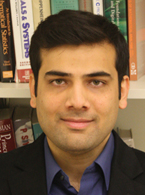Zeeshan Syed receives NSF CAREER Award for work in computationally generated biomarkers

Zeeshan Syed, Assistant Professor of Computer Science and Engineering, was recently awarded an National Science Foundation CAREER grant for his research project, “Computationally Generated Biomarkers.”
The CAREER grant is one of NSF’s most prestigious awards, conferred for “the early career-development activities of those teacher-scholars who most effectively integrate research and education within the context of the mission of their organization.”
Research Focus:
Despite recent progress in medicine, the disease burden of many critical clinical conditions remains unacceptably high because of a failure to promptly match patients to treatments that are appropriate to their current condition or their individual risk. There is a critical need in this setting for novel biomarkers to guide decision-making. The goal of Prof. Syed’s research is the development of a computational framework that allows for the structured discovery of novel, highly-discriminative risk markers from terabytes and even potentially petabytes of physiological data routinely collected in clinical settings.
The proposed framework explores a symbolization-based approach to transform large volumes of long-term data into a form where it can be analyzed in a systematic and computationally efficient manner for characteristics associated with risk. Early investigation of the ideas that form the basis of the proposed work have shown great promise for cardiovascular applications. Clinical studies in two separate cohorts with nearly 6,000 patients show that this framework enables the discovery of risk markers from ECG signals that identify patients at an 8-9 fold increased risk of death within three months of a heart attack, and moreover, that this information is independent of other generally accepted risk variables.
Prof. Syed’s broader research interests are in the application of machine learning and signal processing to problems in clinical medicine and developing world healthcare. Specific areas include computational biomarkers to predict cardiovascular and neurological disorders; treatment planning for cancer and surgery; low-cost software-based surrogates for expensive diagnostic hardware; sustainable information and communication technologies for global health education and disease prevention.
Prof. Syed is affiliated with the Artificial Intelligence Laboratory, the Center for Computational Medicine and Bioinformatics, and the Center for Global Healthat the University of Michigan. He is also affiliated with the Center for Health Services Research at the Henry Ford Hospital, and the Data-Driven Medicine Group at MIT.
 MENU
MENU 
